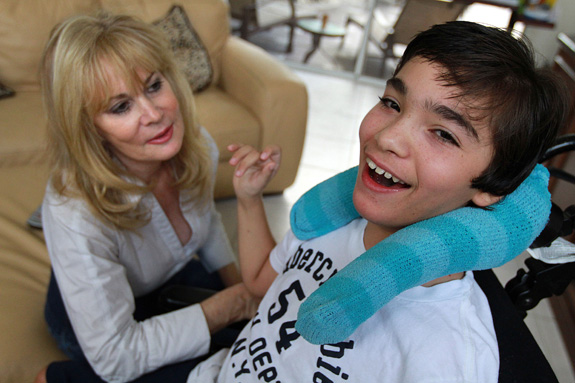Teens With Cerebral Palsy Rate Quality Of Life High

Judy Susser, left, of Boca Raton, Fla, with her son Adam, who has cerebral palsy. A new study suggests that adolescents with cerebral palsy have a quality of life comparable to their peers without the condition. (Carline Jean/Sun Sentinel/MCT)
Adolescents with cerebral palsy have a similar quality of life to others their age, a new survey suggests.
Despite the hurdles that can come with having a developmental disability, researchers say in a new study that teens with cerebral palsy reported similar overall satisfaction with their lives.
The findings published this month in the journal The Lancet come from a study looking at 431 Europeans ages 13 to 17 with cerebral palsy. The teens were asked to complete a survey inquiring about their quality of life and their physical and emotional health. Their responses were then compared to those from a group of age-matched teens without cerebral palsy.
Advertisement - Continue Reading Below
On average, teens with the condition ranked their quality of life at least as strong as their peers in nearly every domain, the study found. What’s more, adolescents with cerebral palsy rated their quality of life even higher than their typically-developing peers in terms of relationships with parents, school life, autonomy, self-perception as well as moods and emotions.
The only area where teens with cerebral palsy appeared to struggle far more than others their age was in finding social support from friends, researchers said.
Meanwhile, however, those with more severe motor impairment were more likely to report poorer quality of life in regard to moods and emotions, autonomy and social support from peers, the study found. Individuals who struggled with pain in childhood or adolescence and those who experienced high parenting stress or psychological problems also tended to have less positive responses.
Researchers said the findings can help identify areas of need for young people with cerebral palsy.
“Clinicians should intervene early in childhood to ameliorate extremes of pain, psychological problems and parenting stress, for which effective interventions are available,” said Allan Colver of Newcastle University in England who led the study. “Attention should be directed to helping children with cerebral palsy, especially those who are more severely impaired, to maintain friendships with peers and to develop new friendships as they move into adolescence.”
In an accompanying commentary, Alexander Hoon and Elaine Stashinko from the Kennedy Krieger Institute in Baltimore said the study findings are “encouraging.”
“An important point of Colver and colleagues’ study is that there are modifiable factors that can positively change (quality of life) in children with cerebral palsy,” they wrote.
Read more stories like this one. Sign up for Disability Scoop's free email newsletter to get the latest developmental disability news sent straight to your inbox.
